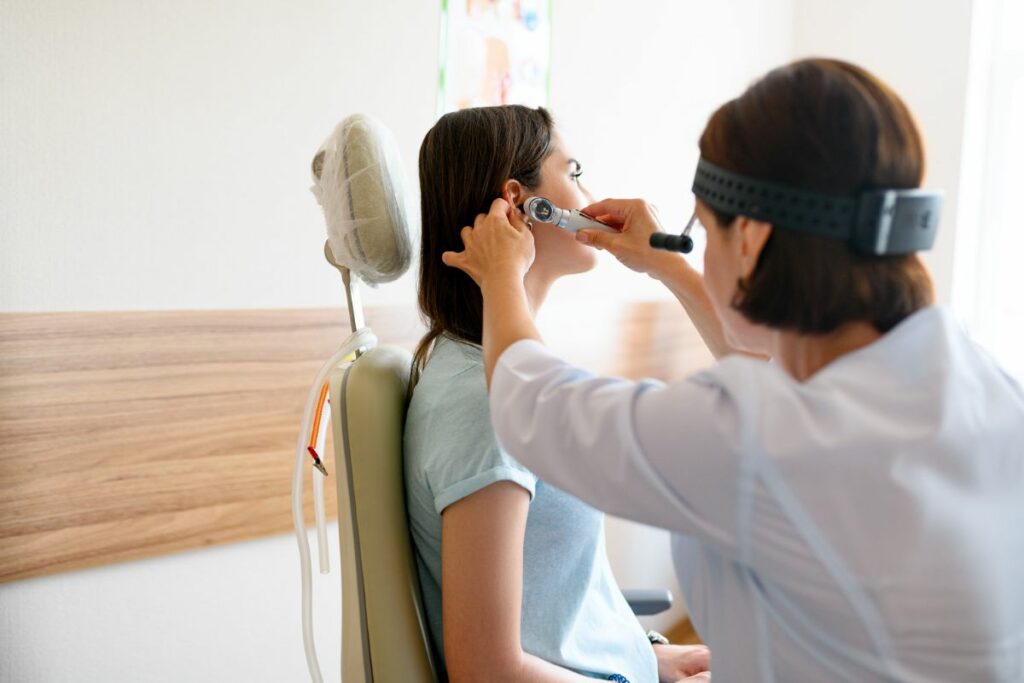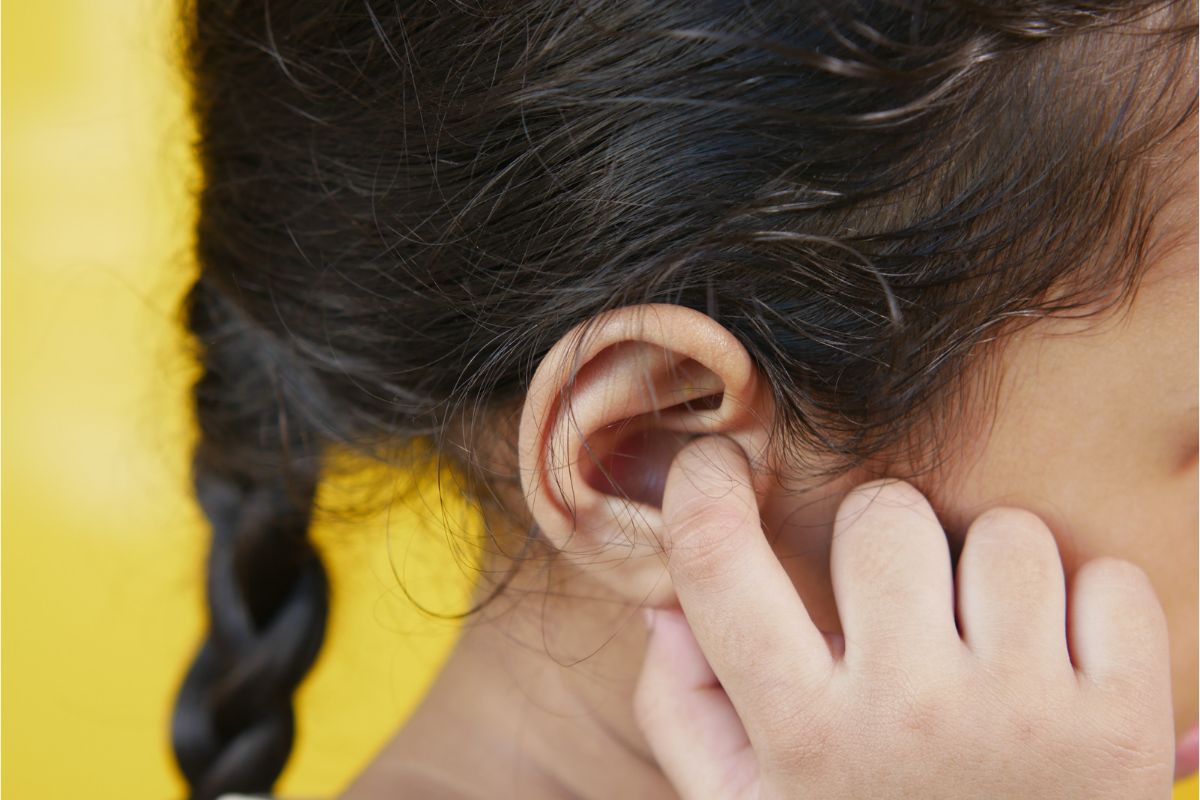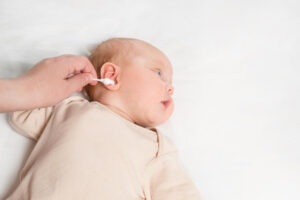Introduction:
Ear discharge or otorrhea is a condition where ears secrete fluid; it may be watery fluid, pus, or blood. People often misapprehend earwax and ear discharge. Earwax is naturally produced by our body to protect the ear from bacteria and other foreign substances. Watery discharge from ear occurs in people of all ages, and it is a sign of infection or trauma in the ear. Pay attention to your ears, don’t neglect ear discharge.
How to identify an ear discharge?
You can identify ear discharge by the following characteristics:
- If the discharge is yellowish or grey in colour
- Foul-smelling discharge
- Earache and swelling
- Ringing in ear
- Trouble hearing

What are the causes of ear discharge?
Ear discharge can be caused by a variety of factors, like:
Ear infections, such as otitis media or swimmer’s ear, commonly cause ear discharge. These infections can cause the eardrum to rupture, leading to fluid or pus draining from the ear. Ear infections can be caused by bacteria or viruses and affect the inner or outer ear.
Eczema in the ear canal can cause itching and irritation, leading to ear discharge. Eczema is a chronic skin condition that can affect various parts of the body, including the ear canal.
Allergic reactions to certain substances can cause inflammation in the ear canal, leading to ear discharge.
Trauma to the ear, such as an injury to the head or a foreign object in the ear, can cause ear discharge. Trauma can cause damage to the eardrum or other parts of the ear, leading to fluid or pus draining from the ear.
Tumours in the ear rarely cause ear discharge. Tumours can be benign or malignant and affect various parts of the ear, including the eardrum and the ear canal.
What are the types of ear discharge?
Clear fluid or watery fluid occurs after swimming or a head bath. In some cases, water mixes with ear wax and drains out. Clear fluid drain is not a severe condition. Clean the ear with a dry cloth to prevent infection.
Any injury in the middle ear causes blood to drain. A ruptured eardrum or trauma in the inner ear also causes blood to drain from the ear. Consult an ENT specialist immediately in case of blood discharge.
Pus or yellowish discharge indicates ear infection. Middle ear or inner ear infection causes this type of secretion. Adults should seek medical care if discharge persists for more than 2 days. If discharge is seen in children, consult a paediatric ENT specialist immediately.
When to seek medical care?
If you notice ear discharge and exhibit the following symptoms, immediately consult an ENT specialist
- Trouble hearing sounds or sudden blocking of ears
- Ear discharge associated with severe pain
- Swelling in-ear or neck region
- Ear drainage persists for more than 2 days
- Itching in the ear
- Tinnitus (occasionally)
What is the treatment for ear discharge?
Treatment for ear drainage depends on the type of ear drainage:
Doctors prescribe over-the-counter medication like antibiotics, decongestants, and antihistamines that relieve the symptoms. Medication will relieve earache, swelling and other symptoms.The symptoms will be relieved in 2-4 weeks, and complete recovery is seen in 2 months.
Surgical treatment is suggested if the drainage is caused by eardrum rupture. In many cases, the perforated eardrum is cured with medication. If the infection is severe and the ruptured eardrum is not cured with medicines, then surgery is performed to clear the infection.
In rare cases, surgery is required to remove foreign objects and tumours present in the ear to cure ear discharge.
How to prevent ear discharge?
Ear discharge can be prevented by taking care of the ear. These steps include:
- Avoid inserting sharp objects into the ear
- Keep ears clean and dry after swimming and head bath
- Avoid swimming in dirty and murky waters
- Use ear plugs in air travel
- Do not blow your nose forcefully
- Seek prompt treatment for ear infections and cold
- Avoid exposure to loud noise
Conclusion
Ear discharge can be a sign of an underlying condition. Consult an ENT specialist and get prompt treatment. A proper diagnosis and treatment are needed to prevent complications and curb ear discharge.
FAQs
Does eardrum rupture cause ear discharge?
In most cases of an eardrum rupture, blood-filled or yellowish ear discharge is seen as a cause. If you suffer from ear discharge along with pain or itching, immediately consult an ENT specialist. Not all ear discharge occurs by eardrum rupture, but prompt action is to be taken to mitigate the underlying cause.
Does ear discharge lead to ear infection?
Not all ear discharges lead to an ear infection. Ear discharge occurs due to various reasons. If you experience ear discharge for more than 48 hours, consult an ENT specialist.
Does smelly ear discharge cause more trouble than normal discharge?
Yes, smelly ear discharge occurs if there is an internal infection or trauma in the ear. Normal or watery discharge occurs when water enters the ear. Consult an ENT specialist immediately if you experience smelly ear discharge.
Is ear discharge normal?
Ear discharge is not normal, and it could be a sign of infection, eardrum rupture, trauma, tumour or any ear problem. Pay attention to ear discharge, and get appropriate treatment.
Can ear discharge cause hearing loss?
Ear discharge caused by eardrum rupture may lead to temporary hearing loss. Get timely treatment for ear discharge to mitigate the risk of permanent hearing loss conditions.
What causes ear discharge in babies?
Two reasons cause ear discharge in children:
- Accumulation of water in the ear canal (not severe)
- Infection or damage to the eardrum (severe and needs immediate medical care)
Consult a paediatric ENT specialist if your toddler suffers from ear discharge.

Why consult EarSurgeon, Dr. Shree Rao?
Dr. Shree Cuddapah Rao is acclaimed as one of the best pediatric ENT specialists in Hyderabad. With 10+ years of deep domain experience in the field of ENT, she is the director at Dr. Rao’s ENT Super Specialty Hospital. She underwent specialized training in Rhinoplasty / Facial Plastic surgery at Singapore General Hospital, Singapore. She also underwent advanced training in cochlear implant surgery under Padmashri Dr. Milind V Kirtane and had a Fellowship in a cochlear implant. Having performed over 200 successful cochlear implants for patients worldwide, Dr. Shree Cuddapah Rao is also the recipient of several prestigious accolades in the domain of ENT. Dr. Shree Rao is one of the best ent doctor in hyderabad, to book an appointment click here.
Are you looking for
then you have landed at right place!







